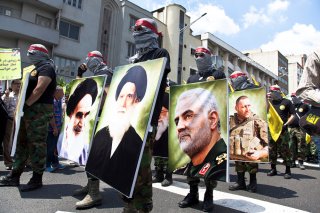Prosecute Hamas Funders as Accessories to Murder
Officials of the Iranian government are guilty of funding terrorism; they should meet with the consequences.
As Palestinian rockets rain down on Israel this week, killing indiscriminately and terrorizing the population, there are reports worldwide of demonstrations celebrating the slaughter of Israel’s citizens. Perhaps none more so than in Iran, where the government has endorsed the “anti-Zionist resistance” and praised the attack on Israel as a “proud operation” and a “victory.”
Tehran is one of the most significant backers of the Palestinian terrorist group Hamas—the perpetrator of the latest assault on Israel that has so far taken more than 900 lives, injured thousands, and resulted in more than 100 taken hostage. While Iran has denied active involvement in helping Hamas perpetrate the assault, and Israel and the United States have yet to definitively determine and acknowledge Iran’s hand in this devastating terrorist invasion of Israel’s sovereign territory, there are literally smoking guns all over the country, and Iran’s fingerprints are clearly on the murder weapons.
Shortly after the first rockets were launched on Saturday, October 7, senior leaders of Hamas and the Lebanon-based terrorist group Hezbollah confirmed that Iran’s Islamic Revolutionary Guard Corps (IRGC) helped plan the operation and had been meeting with them since August in Lebanon, with the IRGC giving the final go-ahead for the assault last Monday, October 2, in Beirut. Iran has a long history of support for ideologically aligned terrorist groups and violent non-state actors, and the relationship between the IRGC, Hamas, and Hezbollah spans many decades. Therefore, it would be no surprise that Iran has facilitated the latest onslaught against Israel.
The IRGC was established in the aftermath of Iran’s 1979 Islamic Revolution as a core branch of the Iranian Armed Forces, charged with preserving Islamic ideology and values by operating extraterritorially and extrajudicially. To advance the Revolution’s new theocratic agenda, the IRGC began to deploy agents outside of Iran and to sponsor Islamist militants and terror groups such as Hezbollah—formed in 1982 whose name means the “Party of God” and is considered Iran’s terror proxy in southern Lebanon.
After Ayatollah Ali Khamenei became Supreme Leader of the Islamic Republic in 1989, the IRGC began to more formally support other violent non-state actors such as Palestinian Islamic Jihad and Hamas, whose 1988 charter outlines the destruction of Israel as necessary for the establishment of an Islamic state in Palestine. For more than 30 years, Tehran has bolstered Hamas by providing it with a significant portion of its funding and offering military-type training in Iran.
Although Iran has denied orchestrating the latest plot against Israel, claiming that the actions taken by Hamas were “fiercely autonomous,” Hamas and Hezbollah would likely not undertake an initiative of this magnitude without extensive preparation and the involvement and express authorization of Tehran. Furthermore, the claims of Hamas and Hezbollah leadership that the IRGC helped plan the operation out of Lebanon to the north of Israel and Gaza in the south are also consistent with Iran’s often-stated objective to surround and strangle Israel from all sides.
While the search continues for “concrete evidence” of Iran’s involvement in the violent attack on Israel, Tehran’s financing and decades-long support for Hamas should not make it too difficult to find. The United States designated Hamas and Hezbollah as Foreign Terrorist Organizations in 1997, a designation which prohibits providing those groups with material support or resources, knowing that such support would be used to commit a terrorist offense as listed in the Antiterrorism and Effective Death Penalty Act of 1996. In addition, the United Kingdom’s Terrorism Act of 2000 lists the criteria for proscribing or “outlawing” terrorist organizations and indicates that supporting terrorist groups, including funding, is unlawful.
The criminalization of terror financing underscores that simply supporting terrorism is deemed tantamount to committing the terrorist act itself. For Iran and the IRGC to be culpable, we don’t need to see them pull the trigger—financially supporting and assisting Hamas is sufficient to determine their guilt in the savage murder and maiming of thousands of Israelis.
In legal parlance, they would be accessories to murder. And that’s what just occurred—Hamas terrorists murdered, kidnapped, and brutalized innocent Israeli civilians. The terror organization is motivated by an Islamist ideology shared by Iran and funded by its regime to advance their common territorial agenda to destroy Israel and establish an Islamic state in her place.
In addition to military retaliation against Hamas and Iran, criminally prosecuting Iranian and IRGC officials under US or UK law for the Hamas attack on Israel and her citizens must be on the table when the time is right, and there is ample international precedent for bringing legal action against supporters of terrorism.
As Israel now plans to hold accountable all actors who are perpetrating this vicious onslaught against her land and people, to root out all enemies, they must look beyond the immediate aggressors of Hamas and cast a wider net. As financiers and supporters, Iran is equally as culpable as Hamas. It must not be allowed to hide behind its proxies and proclaim its innocence of the crimes it has enabled Hamas to commit.
Elizabeth Samson is an Associate Research Fellow at the Henry Jackson Society and a former Visiting Fellow at the Hudson Institute.
Image: Shutterstock.

